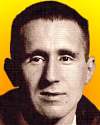 (source)
(source)
|
Bertolt Brecht
(10 Feb 1898 - 14 Aug 1956)
German poet and playwright who is noted for his script for The Threepenny Opera (1928) for which Kurt Weill provided a jazzy score.
|
Science Quotes by Bertolt Brecht (5 quotes)
Art and science coincide insofar as both aim to improve the lives of men and women. The latter normally concerns itself with profit, the former with pleasure. In the coming age, art will fashion our entertainment out of new means of productivity in ways that will simultaneously enhance our profit and maximize our pleasure.
— Bertolt Brecht
Brecht’s positive vision of theater in the coming age of technology, expressed in Little Organon for the Theater (1949). In The Columbia World of Quotations (1996).
Art and science work in quite different ways: agreed. But, bad as it may sound, I have to admit that I cannot get along as an artist without the use of one or two sciences. ... In my view, the great and complicated things that go on in the world cannot be adequately recognized by people who do not use every possible aid to understanding.
— Bertolt Brecht
Bertolt Brecht, John Willett (trans.), Brecht on Theatre (1964), 73.
I don’t trust him. We’re friends.
— Bertolt Brecht
Dialog by Officer (character) in play, Mother Courage and Her Children: A Chronicle of the Thirty Years' War (1955), 43. In another edition, seen as “I don’t trust him. You see we’re friends” and as an epigraph as “Because I don’t trust him, we are friends,” (In William F. Allman, The Stone Age Present (1994, 1995), 71.
Science knows only one commandment—contribute to science.
— Bertolt Brecht
In The Life of Galileo (1939) translated by Howard Brenton (1980), Andrea in scene 14. In Robert Andrews Famous Lines: a Columbia Dictionary of Familiar Quotations (1997), 431.
The aim of science is not to open the door to infinite wisdom, but to set a limit to infinite error.
— Bertolt Brecht
Play, The Life of Galileo (1939, 1994), scene 9, 74.
Quotes by others about Bertolt Brecht (1)
When Hitler arrived in 1933, the tradition of scholarship in Germany was destroyed, almost overnight. … Europe was no longer hospitable to the imagination—and not just the scientific imagination. A whole conception of culture was in retreat…. Silence fell, as after the trial of Galileo. The great men went out into a threatened world. Max Born. Erwin Schrödinger. Albert Einstein. Sigmund Freud. Thomas Mann. Bertolt Brecht. Arturo Toscanini. Bruno Walter. Marc Chagall. Enrico Fermi. Leo Szilard….
In Ch. 11, 'Knowledge or Certainty', The Ascent of Man, (1973), 367.
 In science it often happens that scientists say, 'You know that's a really good argument; my position is mistaken,' and then they would actually change their minds and you never hear that old view from them again. They really do it. It doesn't happen as often as it should, because scientists are human and change is sometimes painful. But it happens every day. I cannot recall the last time something like that happened in politics or religion.
(1987) --
In science it often happens that scientists say, 'You know that's a really good argument; my position is mistaken,' and then they would actually change their minds and you never hear that old view from them again. They really do it. It doesn't happen as often as it should, because scientists are human and change is sometimes painful. But it happens every day. I cannot recall the last time something like that happened in politics or religion.
(1987) -- 


